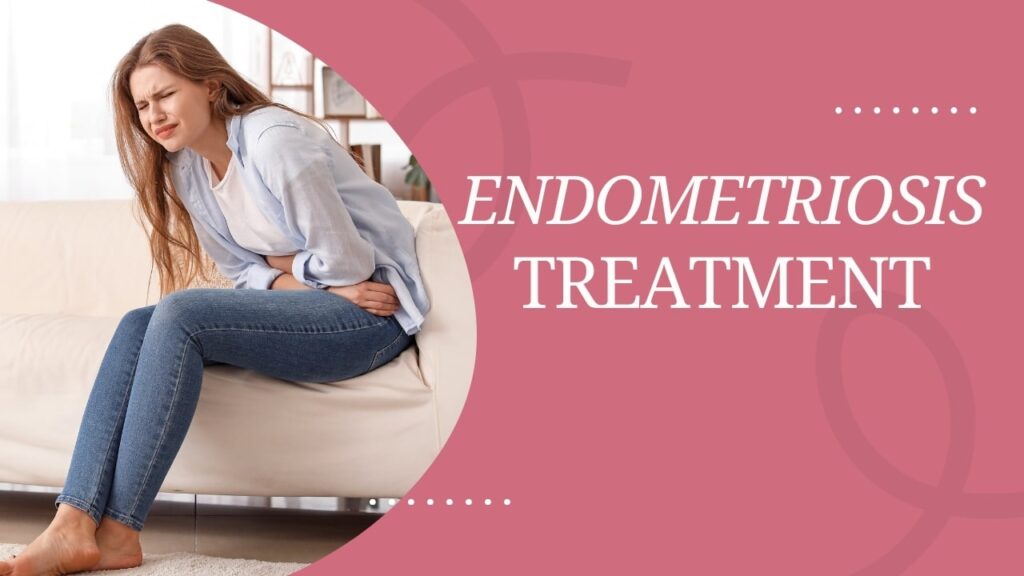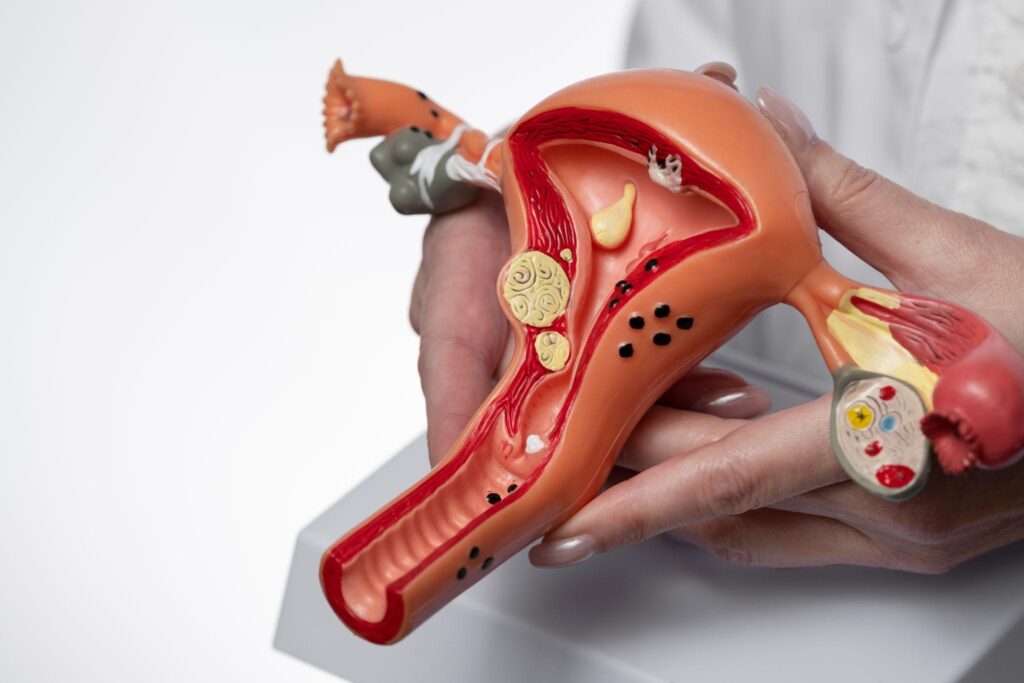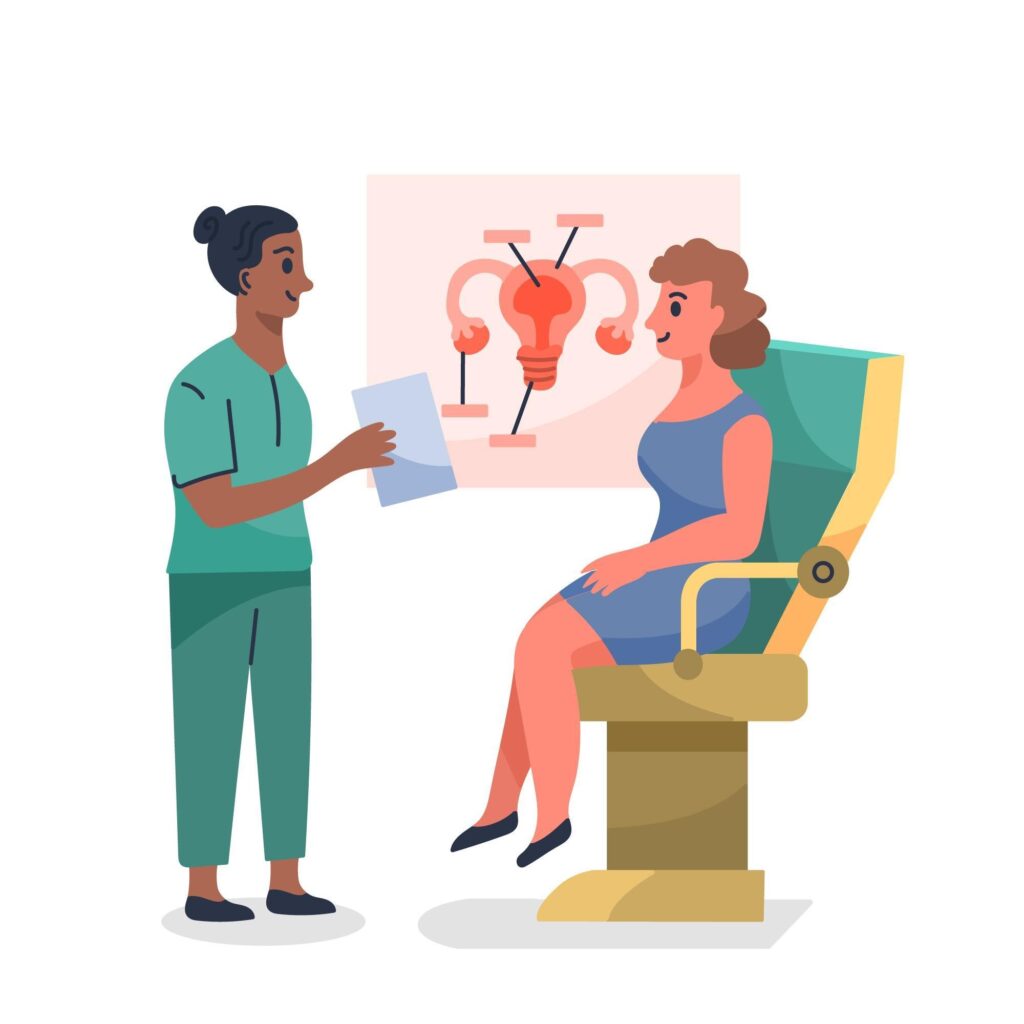Last updated on May 21st, 2025 at 12:58 pm
 Endometriosis, a condition where tissue similar to the lining of the uterus grows outside the uterus, affects millions of women worldwide. Beyond the physical pain, it can significantly impact quality of life, fertility, and mental health.
Endometriosis, a condition where tissue similar to the lining of the uterus grows outside the uterus, affects millions of women worldwide. Beyond the physical pain, it can significantly impact quality of life, fertility, and mental health.
Fortunately, various treatment options are available to manage symptoms and improve overall well-being. Endometriosis arises when tissue akin to the uterine lining, known as endometrium, proliferates beyond the confines of the uterus. This tissue can develop on the ovaries, fallopian tubes, outer surface of the uterus, and other pelvic organs.
Each menstrual cycle, these abnormal tissue growths respond to hormonal changes, causing inflammation, pain, and sometimes scar tissue formation (adhesions). Symptoms vary widely among individuals but commonly include pelvic pain, heavy menstrual bleeding, painful intercourse, and infertility.
Endometriosis Treatment
The best treatment endometriosis are mentioned below:
1. Pain Management
Nonsteroidal Anti-Inflammatory Drugs (NSAIDs): Over-the-counter medications like ibuprofen and naproxen can help alleviate pain and inflammation associated with endometriosis.
Hormonal Therapies: Hormonal contraceptives such as birth control pills, patches, and hormonal intrauterine devices (IUDs) may be prescribed to regulate menstrual cycles, reduce pain, and slow the growth of endometrial tissue.
2. Gonadotropin-Releasing Hormone (GnRH) Agonists and Antagonists
These medications work by suppressing ovarian function, thus reducing estrogen levels and halting menstruation. While effective in relieving symptoms, they may cause menopausal side effects like hot flashes and bone density loss.
3. Progestins
Progestin-based therapies, including oral contraceptives, progestin-only pills, injections, and intrauterine devices (IUDs), can help manage symptoms by thinning the endometrial tissue and reducing menstrual bleeding.
> Consult a Doctor and Medkart will help you Order Medicines Online
4. Surgery
Laparoscopic Surgery: This minimally invasive procedure involves removing endometrial implants, scar tissue, and cysts while preserving the reproductive organs. It can provide significant pain relief and improve fertility for some individuals.
Hysterectomy: In instances of severe conditions resistant to alternative treatments, a hysterectomy (the surgical removal of the uterus) might be advised. This is often considered a last resort, particularly for those not planning to conceive in the future.
5. Alternative Therapies
Complementary approaches like acupuncture, physical therapy, dietary changes, and stress management techniques may help alleviate symptoms and improve overall well-being. While these methods may not directly treat endometriosis, they can complement conventional treatments and enhance overall quality of life.
Emerging Therapies
Medical research continues to explore novel approaches to managing endometriosis. Some promising developments include:
Immunomodulators: Drugs that target the immune system to reduce inflammation and immune responses associated with endometriosis.
Targeted Therapies: Medications specifically designed to inhibit the growth and spread of endometrial tissue by targeting molecular pathways involved in its development.
Regenerative Medicine: Innovative techniques utilizing stem cells or tissue engineering to repair damaged tissue and restore normal function in affected organs.

Scar Endometriosis Treatment
Scar endometriosis, a form of endometriosis where endometrial tissue implants itself within surgical scars, presents unique challenges in treatment. Typically, scar endometriosis manifests as painful nodules or lumps at the site of a previous surgery, such as a cesarean section or hysterectomy incision.
Treatment options for scar endometriosis often involve a combination of surgical excision and medical management. Surgical removal of the affected tissue is typically necessary to provide long-term relief from symptoms, such as pain and swelling. However, given the high likelihood of recurrence, especially if not all endometrial tissue is removed during surgery, adjunctive medical therapies like hormonal treatments may be prescribed to suppress the growth of any remaining endometrial implants.
Additionally, in cases where fertility preservation is a concern, a multidisciplinary approach involving fertility specialists may be warranted to explore options for preserving reproductive function while effectively managing scar endometriosis.

Conclusion:
Endometriosis is a complex condition with diverse manifestations and treatment needs. While there’s currently no cure, various medical and surgical interventions can effectively manage symptoms and improve quality of life for individuals with endometriosis.
It’s essential for those affected by this condition to work closely with healthcare providers to explore treatment options tailored to their needs, preferences, and long-term goals. Additionally, ongoing research offers hope for more effective therapies in the future, highlighting the importance of continued investment in understanding and addressing endometriosis.
Read: What are Generic Medicines?
FAQs on Endometriosis Treatment
Q1. What is endometriosis treatment?
Endometriosis treatment involves a multifaceted approach aimed at managing symptoms, reducing inflammation, and preserving fertility. Options include medication such as hormonal therapies and pain relievers, surgical interventions like laparoscopic excision to remove endometrial tissue, and lifestyle modifications.
The choice of treatment depends on factors such as the severity of symptoms, desire for fertility, and individual preferences, often requiring a personalized approach in consultation with healthcare providers.
Q2. Is surgery always necessary for treating endometriosis?
Surgery, particularly laparoscopic excision, is often recommended for severe cases or when conservative treatments fail to provide relief. However, hormonal therapies and pain management strategies can be effective alternatives, especially for those seeking non-surgical options.
Q3. Are there any natural remedies or lifestyle changes that can help alleviate endometriosis symptoms?
While natural remedies and lifestyle changes may offer some relief from endometriosis symptoms, such as dietary modifications, exercise, and stress reduction techniques, they’re typically used as complementary approaches alongside conventional medical treatments rather than standalone solutions. Always consult with a healthcare provider before trying any new treatment approach.
Related Links:
- Dog Bite Treatment
- Breast Cancer Treatment
- PCV in Blood Test
- Normal Hemoglobin Level in Female
- How to use Menstrual Cups?
- How to Remove Gas from Stomach Instantly?
- How to Reduce Period Pain?
- How to increase Testosterone Level?
- How to Increase Sex Stamina?
- How to eat Chia seeds?
- How to check Pregnancy at Home?
- Home Remedies for Stomach Pain
